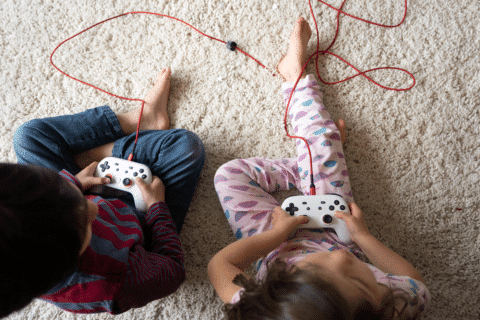Every parent has played the high stakes game of sleeping-baby-to-crib transfer. It’s just so fun. You’ve spent an hour, maybe two, bouncing, rocking, and soothing your baby to sleep. Waiting, with increasing frustration, for those alert eyes to finally close. But now they have, and you need to put your cuddly bundle down. And you know that a botched transfer could have your sleep-resistant angel staring up at you all over again. Ready for another long hour of soothing.
This was my first child. At just ten weeks old he slept through the night. But getting him there got increasingly harder as he got older. The bath, bottle, book, cuddle routine went from half-an-hour to two or more. Naps were non-existent unless we held him. We were tired and frustrated. Ready to try anything.
We bought a noise machine. Then a lavender diffuser. I sewed blackout shades for his windows. We kept his routine consistent. And we read half a dozen books on sleep training. But still, he needed to be rocked and held. I was terrified of sleep training. The lingering effects of postpartum depression remained a part of my life and the idea of just letting my baby cry was too much. We needed help.
Discovering sleep training coaches
After a trying holiday weekend with our almost 10-month-old baby boy, I commented to a colleague about our sleep troubles. Immediately he said, “You should consider a sleep coach!” He and his wife had hired an infant sleep coach to create a sleep plan for his oldest daughter, then come to the house for a night to help them implement. Then they got six months of phone consultation. “It was life-changing,” he told me.
Still, I was skeptical. First, how much would this cost? And second, who could know my baby better than me? How much would they allow my baby to cry?
In doing my research, I found that there were three types of sleep coaching available. In-person, overnight coaching started at $1,000 for one night in the Boston area. In-home consultations were a little cheaper, at $450 to $500 for a 60-to-90-minute session. Then there were phone, FaceTime, or email consultations from national services that started closer to $200.
The basic process was that we would fill out a detailed intake form on our son’s sleep habits. How often and when he napped, his bedtime routine, where we struggled, and so forth. Then, we would get a personalized plan of action.
Even in our sleep deprived state, $1,000 seemed like far too much to get our little guy to sleep. At least for our budget. And while we weren’t opposed to spending $500, all the local coaches were booked out six-to-eight-weeks.
So, we sent just under $200 to the Baby Sleep Site for their Deluxe sleep consultation package. I filled out our intake form and awaited our instructions.
Learning from our sleep plan
A critical question in Baby Sleep Site’s intake form was how much crying we were willing to contend with. They wouldn’t promise zero crying, we are talking about babies after all, but they weren’t particular believers in the cry-it-out method.
We selected that we could handle “some crying” and received a detailed day-to-day action plan. For under $200, it was way more information than I was expecting. It walked us through what we were doing wrong, some tweaks we could make to our schedule, and what to do first.
A few things surprised us, even after reading some sleep books. First, they recommended that we move our son’s bedtime earlier. We had pushed it out until almost 8 o’clock, believing that his difficulty falling asleep might be that he just wasn’t tired enough. How wrong we were. Overtired babies, it turns out, refuse to sleep. Our coach, Daniella, told us to move his bedtime up to just three hours after his afternoon nap ended. For a while, this meant a 5:30 or 6:00 PM bedtime.
Second, she recommended we start training with bedtime. Not naps. And not to do both at once. While naps might feel like the more natural choice, with nighttime sleep remaining sacred, the most important thing was to get our baby to sleep at night. This way, my husband and I could rest as well. Plus, the first few nights of sleep training would be a struggle and our baby would be tired. He needed his naps, even if that meant continuing to rock him for a few days.
We made the adjustments and got to work just days before New Year’s.
Following our sleep plan
Our “some crying” method meant taking our son through his routine, saying the same goodnight mantra every night, then laying him in his crib. One of us would sit by the crib, telling him we were there and that he was alright, and only picking him up to lay him back down once every ten minutes or so. The hope was seeing us there would calm him and allow him to fall asleep.
How wrong we all were.
Having to look at us but not be held was torture. For both of us. He stood up, held onto the bars of his crib, and screamed. Not for five minutes, or ten, but for over an hour. Stopping only as I approached the crib to lay him back down, starting again with even more vigor when he realized I wasn’t rescuing him from his crib.
After two nights of tears from everyone in the house, I emailed Daniella. I sobbed that this was so much worse. Maybe I should just rock him. He’ll learn to sleep eventually, right?
This, right here, was why we hired an expert. As first-time parents, we didn’t know what was normal. And when you’re tired, and your child is crying, you just want someone to tell you what to do. Daniella did just that.
Adjusting the plan for our unique child
Daniella switched us to a method closer to cry-it-out. I was wary. However, the Baby Sleep Site only suggests a plan like ours for 5% of their clients. And Daniella insisted that this was likely a gentler method for our son. Seeing us was just too upsetting.
So, we did his routine, placed him in his crib, then left the room. Every 20 minutes, we would go back in to lay him down if he was still standing.
The first night he cried for just over an hour. The second for 40 minutes. The third night Daniella warned us he might have what was referred to as an “extinction burst.” A baby that has been responding well will fight back, crying more than ever, once they realize their old behaviors aren’t getting the desired results. That night, he cried for almost 90 minutes. Twice I thought he might make himself sick. Then, he laid himself down and fell asleep for twelve hours and woke up happy. That was, mostly, the end.
The fourth night, he cried for just 15 minutes. By the end of the week, his bedtime routine was a no-tears event. Daniella was our virtual support network through it all. And I could have kissed her.
Our son never developed a fear of his crib. In fact, he loved it until it was time to move him to a toddler bed. He goes through bursts where he will spend an hour or more talking to himself before succumbing to sleep. A major chatter-bug, that one. But he still gets an excellent sleep almost every night, wherever we are. I consider the $200 well spent.
What to consider before hiring a sleep coach
Remember that babies are babies, and the first year, especially with the first child, can seem like forever. No matter what, you will get through it.
Before you make any decisions, talk about the pros and cons with your partner and others you trust. Get some feedback, especially since you’re exhausted and may be ready to trade your house for eight hours of shut-eye. Ask yourself what your long-term priorities are. We all fall somewhere on a vast spectrum of parenting styles and you should think about your style first, and then plan around it. If you consider yourself an attachment parent or you hope to do any co-sleeping in the future, solo sleep training may close that door.
If you’re at the end of your rope, or just one not sure where to start, a baby sleep coach could be for you. Depending on where you live, in-home infant sleep coaches might be abundant or non-existent. You’ve got multiple options for hiring phone- or internet-based coaches, like the one we hired. They all have different rates and practices.
Here are a few questions to ask when you research sleep coaches:
- How much experience does this person have? What training have they received?
- Does the consultant believe in the cry-it-out method? Are you comfortable with that?
- If the sleep plan provided by your coach doesn’t work, are you able to get updated advice?
- Do you need a plan that is breastfeeding friendly? Can the coach accommodate?
- Are follow-ups included? If not, how expensive are they?
- Does your coach work on weekends?
- How much are you willing to spend?
For me, almost two years later, the $200 price was definitely worth the results. Knowing the valuable support and positive outcome, I would pay twice that. And if our youngest starts to struggle, we won’t hesitate to hire a coach again.
Chelsea Brennan is the founder of Smart Money Mamas, a personal finance blog that focuses on family finance, investing, and reducing money stress. Chelsea is an ex-hedge fund investor whose work has appeared in a wide array of publications, including Forbes, Business Insider, and more.





